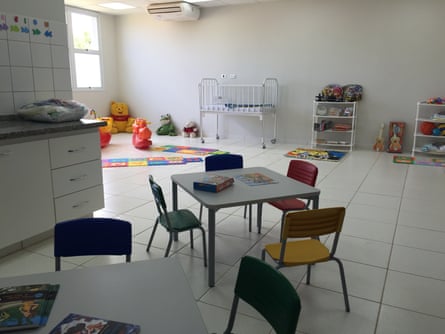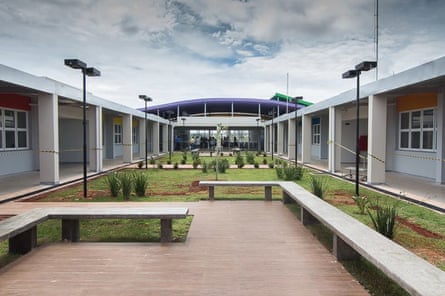Lucas da Silva* sits in a cell while he waits to hear from the court what will happen to him.
The 33-year-old is not in a prison, but at Casa da Mulher Brasileira (“house of the Brazilian woman”), a centre for survivors of violence in Campo Grande, central Brazil, that is open 24/7.
Men can be detained here for up to 48 hours after arrest while the court decides what measures, such as restraining orders, are necessary. There are two cells; each can hold four men.
In the same building is an all-female team of police officers who specialise in violence against women, a specialist team from the department of justice, family court representatives, a community patrol assisting women at risk, social workers, psychologists, a creche and temporary accommodation with a kitchen.
When it opened in 2015, the Casa was the first of its kind in Brazil. There are now seven across the country, offering essential services in one place.
Given reports that coronavirus lockdowns around the world are leading to a catastrophic rise in domestic violence, the centre has never been more vital.
Casa has remained open despite coronavirus restrictions. The only difference is that some services are now run remotely, physical distancing measures are in place and everyone wears masks. The centre has seen a slight decrease in the number of people visiting, but staff put this down to limited public transport and movement rather than a reduction in violence.
Da Silva was drunk when he hit his wife in front of their three-year-old son and she fell and hit her head.
“It happened over nothing,” he says. “I regret that this happened … But I think I’m being unfairly treated, because you can’t compare my strength with my wife’s. She also hit me, yet I’m the one in jail.

“We’ve had many ugly arguments where we’ve pushed each other, but never to this extent.”
In the cell next door, two men sit on the floor, while two others sit with their elbows on their knees. No one wants to talk.
Violence against women is rife in Brazil. A 2019 report by the Brazilian forum of public security found the rate of femicide had increased by 4% in 2018 from the previous year. In 88% of cases, the aggressor was the woman’s current or former partner. Every two minutes, an act of violence against women is committed among the population of roughly 212 million people.
Covid-19 restrictions have added to the misery. Last month Reuters reported a 45% rise in reported cases of violence against women in Sāo Paulo alone since restrictions were imposed in the city, compared with a year earlier.
Between January and August last year, the state of Mato Grosso do Sul, of which Campo Grande is the capital, had the third highest number of reports of domestic violence.
Centres like the Casa could be a way forward in tackling the problem, providing specialised services in one place for survivors.

But Maria Laura Canineu, Brazil director for Human Rights Watch (HRW), says the rollout of more centres across the country has been too slow. “The initial idea of the Casa da Mulher Brasileira programme was to build at least 27 facilities, but that hasn’t happened, certainly limiting the impact it could have for thousands of women in Brazil.”
According to data from HRW, last year the Bolsonaro administration spent none of almost 13m reais (£2m) allocated to build additional houses.
Carla Stephanini, former head of public policy for women in Campo Grande, says: “[With the Casa] we want to structure services so women can be supported. Here, we take the woman and wrap services around her to facilitate her reporting the crime, and to give her confidence in what we offer.
“Now we have to prioritise the prevention of violence and working with men. It’s not going to be quick. Our society is machista – especially in this rural area – and to deconstruct this will take a lot of investment.”
Being in a cell has made Da Silva think. “I’m not going to say I’m right or wrong about what happened. I am now wondering why [my wife and I] had an argument and why I’m here now.”

Da Silva was charged with bodily injury, fitted with an electronic tag and is not allowed within 300 metres of his wife.
Paulo César de Oliveira Santos is an analyst for the judiciary in the Casa. “It’s amazing to see men come here and think they’ve done nothing wrong. They think their wife is their property,” he says. “Their way of thinking is so childish. They say they’re not scared of the police but then they come and experience the reality of being in a cell and start crying in front of the judge.”
Elza Loschi, who works at the Casa and has now assumed Stephanini’s position, says: “Sometimes I have to come out of my office to tell [the men] to be quiet because they are making so much noise and we need to work,” she says. “They scream, and cry for their mothers.”
Since the Casa opened, more than 68,000 women have reported to its reception (the figure includes returning women); 16,935 protective measures such as restraining orders have been sought, and police have dealt with 30,064 reports of domestic violence.

Down the corridor from the cells, Renata Gomes’s* mobile rings. The caller ID comes up as “Amor” (“Love”) – her husband. He has called 45 times this morning, but she has not picked up.
Last night Gomes’s husband woke her up at 1am to show her a porn video and accused her of being in it. He punched her twice before grabbing a piece of wood and threatening to kill her.
Her children, aged two, four and seven, were terrified. “I thought I was going to die because of that video,” she says. Gomes wants a restraining order and a divorce.
She is determined to get her husband out of her life. But how she will support herself and three children on her wages from a cleaning job is a worry.
“Everything I do is for him and my children,” she says. “I took him back once before after he hit me. I forgave him because it was the first time and his mother begged me to, but I regret that now. This time I won’t let anything stop me.”
* Names have been changed
